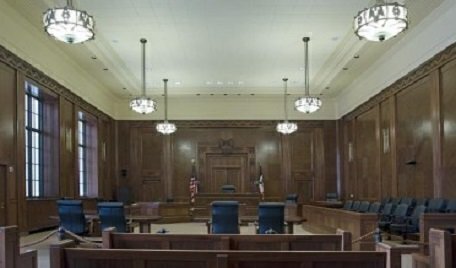The Trump Administration, in simultaneous filings on Monday, asked both the Supreme Court and a federal appeals court to block an undocumented immigrant teenager, now being held in a federal detention center, from having an abortion.
 The plea to the Supreme Court was both a request for immediate postponement of such an abortion, and a backup maneuver to offset the chance that the appeals court – the U.S. Court of Appeals for the District of Columbia Circuit – would not grant a delay this time because it had previously allowed a different undocumented teenager (“Jane Doe”) to get an abortion, which she then did.
The plea to the Supreme Court was both a request for immediate postponement of such an abortion, and a backup maneuver to offset the chance that the appeals court – the U.S. Court of Appeals for the District of Columbia Circuit – would not grant a delay this time because it had previously allowed a different undocumented teenager (“Jane Doe”) to get an abortion, which she then did.
At the same time as the Administration moved to prevent the procedure for a 17-year-old identified in court papers only as “Jane Roe,” it decided not to try to block an abortion for another 17-year-old – identified as “Jane Poe” – because her pregnancy is more advanced. Thus, the second teenager will be able to have her pregnancy ended in a matter of hours. If she does not have the procedure quite soon, the pregnancy could be so far advanced that “Jane Poe” might soon lose the legal right to terminate. Her pregnancy is now in the 22nd week; after the fetus becomes able to live outside of the womb, within about four weeks, the abortion could be blocked in order to protect the life of the fetus, under existing law.
“Jane Doe” is now ten weeks pregnant, according to court records, and the Administration has argued that it may be able to arrange a U.S. sponsor for her within the next two weeks. With a sponsor, she could leave detention, and could then have an abortion if the sponsor agreed.
Earlier Friday, U.S. District Judge Tanya S. Chutkan of Washington, D.C. issued a temporary order – to remain in effect for 14 days – to permit both “Jane Roe” and “Jane Poe” to leave the detention centers where they are being held long enough to go to a clinic and receive abortions. The judge – the same jurist who took similar action in the case of “Jane Doe” – delayed her order for 24 hours to give the Administration the chance to ask higher courts to prevent the abortions.
The Administration, in the new cases as in the one that unfolded earlier this fall, has taken the position that prior Supreme Court rulings allow the government to refuse to “facilitate” an abortion for a pregnant minor who is in official custody after entering the country illegally from another nation. (The home countries of the three teenagers involved so far in the ongoing dispute have not been identified.)
The Administration claim against “facilitating” abortion for detained teenagers is based on prior Supreme Court precedents allowing the government to take action in the interest of protecting the lives of fetuses. (Those precedents make clear, though, that a pregnant woman has a right to abortion by her own choice up to the point where the fetus is capable of living outside the womb, if delivered.
Neither one of the two teenagers now seeking abortions is being held in a detention center in a state that would require them to get a judge’s permission in order to be eligible to have an abortion. Even so, federal immigration officials argue that they have a legal responsibility, toward those held in detention, to make sure that their request for an abortion is an “informed choice.” (The laws of the state or states where these two are being held assume that such young women are competent to make that choice on their own.)
The legal wrangling over abortions for detained teenagers had grown quite complicated, with the Administration still pursuing an earlier appeal in the case involved “Jane Doe,” even though she has had an abortion. The government is trying to prevent Judge Chutkan from turning what was the “Jane Doe” case into a collective lawsuit on behalf of all detained, undocumented teenagers who are or who may become pregnant. So far, the Supreme Court has taken no action on that pending appeal.
Whether the Supreme Court takes any action itself before the D.C. Circuit acts on the delay request there may depend on whether the Justices think the appeals court will act swiftly enough. As an alternative proposal, the Administration suggested that the Court might wish to treat its new plea as an appeal directly from District Judge Chutkan’s order earlier in the day — a bypass of the Circuit Court — and then move immediately to delay that order and the abortion that the judge had decided to permit.
The state of Texas, joined by ten other states, have filed legal briefs in both Judge Chutkan’s court and in the Supreme Court, in an attempt to get a ruling that an undocumented teenager who has entered the U.S. illegally has no constitutional right to seek an abortion. The D.C. Circuit rejected that argument in the “Jane Doe” case, but Texas and its allied states have renewed the claim in the new cases
Legendary journalist Lyle Denniston has written for us as a contributor since June 2011 and has covered the Supreme Court since 1958. His work also appears on lyldenlawnews.com.







